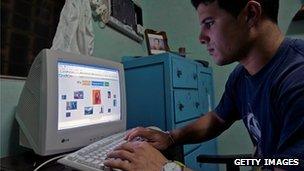Cuba 'to offer' limited public internet access
- Published

The government of Cuba has said it will soon expand public access to the internet, although it will maintain restrictions for access at home.
It said that 118 internet points would be set up on the Caribbean island from 4 June, to allow web surfing for $4.5 (£3) an hour.
Cuba's average salary is $20 a month, and it has one of the lowest levels of internet access in the world.
Most Cubans can connect only at work, at school, or in luxury hotels.
Traffic will be monitored
The easing of restrictions was published in the official paper, Gaceta Oficial.
It said that member of the public will be able to access international websites for $4.5 (£3) an hour - down from $6 - or $0.6 (£0.4) an hour for national sites.
The cost for checking emails will remain unchanged at $1.50 (£1).
The government also reaffirmed that it would continue monitoring internet traffic closely.
Cuba's telecommunications company, Etecsa, will "immediately" stop access to users if they commit "any violation of the norms of ethical behaviour promoted by the Cuban state", the Ministry of Communications said in its government decree.
Only some professionals, like journalists and doctors, are allowed to surf the internet at home.
Most Cubans, however, can get online only in their places of work or study, or check their email at post offices.
They can also use internet points in hotels which mostly cater to international tourists.
Slow connection
Up until recently, Cuba relied upon slow and expensive satellite links for internet connections.
But in January, Etecsa announced it would start using an under-sea fibre-optic cable from Venezuela that would provide high-speed internet connection.
The Communist-led government has blamed limited bandwidth for restricting web access, saying it is forced to prioritise it for universities, companies and research centres.
But critics have accused the government of wanting to censor free speech and control access to information.
- Published24 January 2013
- Published5 October 2012